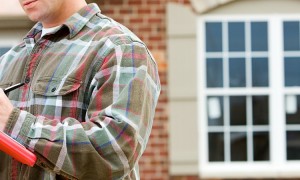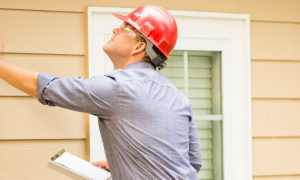Guest Contribution from HomeAdvisor
Hiring a home inspector is a crucial part of buying or selling a home. An inspector will assess the home for potential problems and identify any issues that may affect the continuation or negotiation of a sale in progress. But it’s also important to understand that inspectors don’t cover all of the bases in a home. In fact, it’s possible that an inspector may miss a significant issue. In many cases, you’ll need to hire a specialist to inspect certain areas, and you should always look closely at everything yourself. Here’s the skinny on the “home inspection checklist” and what is and isn’t covered:
#1 Inspectors don’t check for pests.
Home inspectors are not exterminators — their job is to find potential problems with the structural integrity of the house. So if you think you see a cockroach or another pest during a walkthrough, you’ll need to hire an exterminator to take a closer look. Don’t rely on the checklist or final report to yield that information.
#2 Inspectors don’t cover plumbing.
Most home inspectors don’t have the qualifications to look at plumbing and can only call out visible issues like a leak or outdated plumbing. This means they probably won’t look at your:
- Wall or undersink plumbing pipes
- Swimming pools
- Septic tanks
There are exceptions in which an inspector will have the qualifications to look at pools and septic systems, but this varies depending on the inspector and where you live. You shouldn’t rely on your inspector for this in any case. If you see serious cracks or dents in the swimming pool, you should probably hire a swimming pool pro to do an inspection. If you think the septic tank is making weird noises, have someone take a closer look.
#3 Inspectors won’t look at landscaping conditions.
While issues with landscaping should be obvious during a walkthrough — dead spots, potential pests, sprinkler issues, etc. — note that they aren’t on home inspector’s radar. If there’s a dead tree in the yard, you’ll be responsible for taking care of it. It probably won’t affect the final price of the house or your ability to negotiate with the seller.
#4 Appliances aren’t part of the inspection.
Home inspectors check only that the following appliances are working properly:
- Washers
- Dryers
- Dishwashers
- Refrigerators
- Stoves
Most inspectors will run these appliances through just a cycle or two to make sure they work. So, the built-in microwave could have major problems and you wouldn’t know it. Plus, unless a major leak or smoke appears, the appliance is considered to be correctly functioning. If you think there’s a major problem, you should have an appliance technician perform diagnostics and necessary repairs.
#5 HVAC systems aren’t covered in the inspection either.
Home inspectors may or may not touch your heating or air conditioning system, depending on the climate conditions at that time of your inspection. They don’t want to cause damage by putting too much pressure on the system. In fact, in your home inspection report, there may be a liability disclaimer relieving your inspector of any responsibility for your HVAC system. Depending on the conditions at the time of purchase or sale, you may need to have it separately inspected.
#6 Roof leaks are the #1 missed problem.
Home inspectors don’t take huge risks, nor do all climb up onto the roof of a home to check for leaks. Inspectors will use binoculars to look at the roof from the ground level or from a higher window to identify any potential damages. This helps them see missing or torn shingles or nail pops and potential holes, but there may be more to the story. If you live in an area that’s had a lot of intense weather, you may want to hire a roof inspector to ensure that the roof is hole-free and durable.
#7 It’s all about what’s in plain view.
It boils down to what the inspector can see with the naked eye. Issues that may not be addressed in an inspection include those associated with the following:
- Electrical wires
- Foundations
- Sheds or wells
- Areas behind the walls
- Mold, asbestos, radon, etc.
- Chimneys
- Insulation
Problems in these areas could cost you hundreds to thousands of dollars in repairs or replacements — especially if you don’t catch them early. It’s better to be safe and perform a specialized inspection than it is to be blindsided by unexpected repairs.
Andrea Davis is the editor at HomeAdvisor, which connects homeowners with home improvement professionals in their area for free. Connect with Andrea on Google+









Lindsay: I enjoyed reading your article on home inspectors. I picked up a few things I didn’t know. Thanks for your article. By the way I’ll be at Gen Blue, with all the million realtors I hope somehow I will meet you. I’m in the Elmhurst, Illinois office.
This is a awesome list of things to consider when getting a home inspection ready. Thanks for a great read!
So glad you enjoyed it!
We, at the Home Inspection Digest, would like to politely suggest that you refer to whatever Standards of Practice or laws that are the guiding principles for home inspectors in your geographical area. Also understand that SOPs and laws vary from state to state and from association to association.
We suggest this because, well, we find your list at best oversimplified and in some instances wrong.
An example would be #3. True, the home inspector probably doesn’t care if the tree is dead or alive. But if its proximity to the building poses a risk of insect, moisture or physical damage to the building, or could be a fire hazard, it should be in the home inspector’s report as such.
You mentioned an example about a dead tree, but if states are being encouraged to mandate a certified Home Inspector before buying a house, why are they being certified to only report on what is visually seen? To be a valid Home Inspection to a purchaser it should include things like plumbing and HVAC. Otherwise a normal say 1st time Buyer is being mislead by so called requirements and end up with say a Money Pit. I say this because so far I have bought two homes using a Home Inspector and neither time was the Inspection helpful. One of the home was a 40 year old home and one of them was a brand new home. All I ended up was a nice little looking report in a binder and a fee. In the case of the New Home between the VA Inspection and Home Inspection that I paid for I still ended up with a new home that didn’t meet basic Plumbing codes or other visual viewed moldings properly installed. So for me it was a lesson after buying two houses that Home Inspections are currently a rip off and a false since of Security for buying a home especially for a first time buyer and should not be encouraged unless it is like a Homes on Homes Inspection. Thank You!
Caveat emptor. Let the buyer beware. Home inspections, as a rule, have *never* covered everything in and around every home. If the public assumes that they do, the public really needs to learn about what they’re paying for. The Standards of Practice for every major association say exactly the same thing: What’s visible and accessible. That doesn’t mean the inspector will walk around and just casually glance. Most are much more thorough, and even take on unnecessary risk to help provide as comprehensive an inspection as possible. But with our litigious society being what it is, inspectors are also partly governed by what their E&O and liability insurance will cover. It’s incredibly easy to wag a finger at the inspectors. But buyers have a responsibility beyond merely writing a check and hoping for the best. You wouldn’t buy a car without finding out first what came with it. And you wouldn’t buy insurance without reading and understanding the policy.
A home inspector who is very knowledgeable can
educate a client and make them aware of current and potential problems with a property. the buyer, or seller needs to ask questions. a home inspection is visual, and more importantly safety issues are addressed. so, for the gentleman who says a home inspection is a rip off probably did not hire a licensed and certified inspector on the purchase of his two properties.
Also, it is spelt HOLMES ON HOMES
The Inspectors certification rules changed in 1999.. Now Inspectors are required to go to school have field time and take a State and National Exam.. I still hear about the half an hour inspector doing his inspection from his truck.. Make sure you check feferances for an inspector before you hire him.
Darren Johnson.. Johnson Home Inspections Ocean Shores Washington
Seems to me that if the home inspector(s) you know and/or have been using aren’t inspecting the roof, the plumbing, or the HVAC systems then you are using the wrong people. All these items are required to be inspected and reported on per the ASHI Standards of Practice. Just goes to show that there are many “home inspectors” out there that don’t have a clue and that they are a negative influence to the profession. Hire an ASHI member and these items will be inspected and reported on.
Everyone wants a bargain. And they often get what they pay for.
Just read the Home Inspectors’ fine print.
The sad fact is new roof don’t last forever This is absolute, that new roof will be getting older and if got RV Roof Leaks then its time will be shorter with you.
Thought-provoking discussion – I was fascinated by the facts. Does anyone know if my company could grab a sample DS-157 example to work with ?
Standard home inspections evaluate the structural and physical features of the home to identify any damages or safety hazards. According to ASHI, a home inspector examines the heating and central air conditioning systems, interior plumbing, electrical, roof, attic, visible insulation, walls, ceilings, floors, windows, doors, foundation, basement, and other structural components. The inspector points out visual issues that should be corrected to make the home safe.
We purchased our home a almost a year ago. Right after we moved in I noticed the pool had some spots in the wall that looked like leakage. My husband said all this time it was from water splattering over the wall. But I actually discovered it’s leaking. Those crack were there with the calcified marks in the pictures that were taken during the house buying process. Is the inspector liable for totally missing those? Which is going to be quite the job to fix 3 cracks in the pool which is above ground??
I don’t believe home inspection standards, in any state in the US, require a home inspector to inspect an above ground pool. Any defect with an above ground pool does nothing to devalue a home’s worth, IMO.